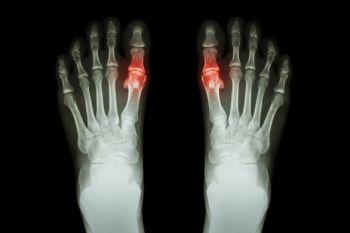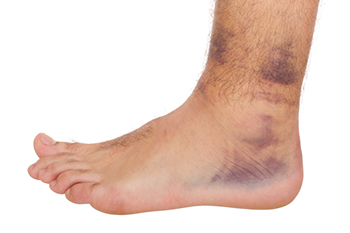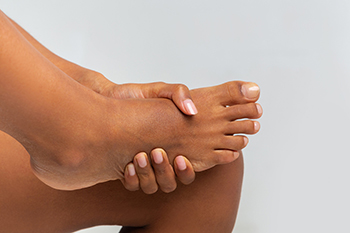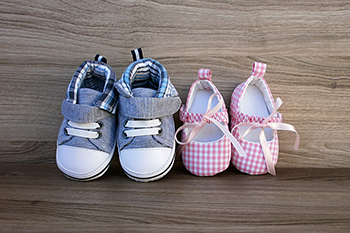Connect With Us
Blog
Items filtered by date: October 2024
Reminder: When Was the Last Time...?
What Is Gout?

Gout is a form of inflammatory arthritis caused by the buildup of uric acid crystals in the joints, often affecting the big toe. It typically appears suddenly, with symptoms such as intense pain, swelling, redness, and warmth in the affected area. Gout attacks can be triggered by certain foods, excessive alcohol, dehydration, or medications. While lifestyle changes, such as dietary adjustments and increased hydration, can help manage mild cases, recurrent or severe attacks may require medical intervention. If you experience debilitating pain or swelling in the big toe that does not improve on its own, it is important to see a podiatrist. This type of doctor may prescribe medications to lower uric acid levels or reduce inflammation, helping to prevent future flare-ups. If you have or suspect you have gout, it is suggested you schedule an appointment with a podiatrist for a comprehensive evaluation and effective treatment options tailored to your needs.
Gout is a foot condition that requires certain treatment and care. If you are seeking treatment, contact one of our podiatrists from Granite State Podiatry Associates. Our doctors will treat your foot and ankle needs.
What Is Gout?
Gout is a type of arthritis caused by a buildup of uric acid in the bloodstream. It often develops in the foot, especially the big toe area, although it can manifest in other parts of the body as well. Gout can make walking and standing very painful and is especially common in diabetics and the obese.
People typically get gout because of a poor diet. Genetic predisposition is also a factor. The children of parents who have had gout frequently have a chance of developing it themselves.
Gout can easily be identified by redness and inflammation of the big toe and the surrounding areas of the foot. Other symptoms include extreme fatigue, joint pain, and running high fevers. Sometimes corticosteroid drugs can be prescribed to treat gout, but the best way to combat this disease is to get more exercise and eat a better diet.
If you have any questions please feel free to contact our offices located in Manchester and Bedford, NH . We offer the newest diagnostic and treatment technologies for all your foot and ankle needs.
What Is a High Ankle Sprain?

A high ankle sprain, medically known as a syndesmotic sprain, occurs when the ligaments connecting the tibia and fibula are stretched or torn, typically from a twisting or rotational injury. This type of sprain is often more severe than traditional ankle sprains and can lead to prolonged recovery times. Common signs include swelling, pain above the ankle, difficulty bearing weight, and tenderness along the outside of the leg. Causes often involve sports activities that require sudden changes in direction or high-impact movements, such as football or basketball. To diagnose a high ankle sprain, a podiatrist will conduct a physical examination, assessing pain levels and range of motion. Imaging tests, such as X-rays or MRI scans may also be used to determine the extent of the injury and rule out fractures. If you have sprained your ankle, it is suggested that you consult a podiatrist who can determine what type of sprain it is, and effectively treat this condition.
Although ankle sprains are common, they aren’t always minor injuries. If you need your ankle injury looked at, contact one of our podiatrists from Granite State Podiatry Associates. Our doctors can provide the care you need to keep you pain-free and on your feet.
How Does an Ankle Sprain Occur?
Ankle sprains are the result of a tear in the ligaments within the ankle. These injuries may happen when you make a rapid shifting movement while your foot is planted. A less common way to sprain your ankle is when your ankle rolls inward while your foot turns outward.
What Are the Symptoms?
- Pain at the sight of the tear
- Bruising/Swelling
- Ankle area is tender to touch
- In severe cases, may hear/feel something tear
- Skin discoloration
Preventing a Sprain
- Wearing appropriate shoes for the occasion
- Stretching before exercises and sports
- Knowing your limits
Treatment of a Sprain
In many cases, the RICE method (Rest, Ice, Compression, and Elevate) is used to treat ankle sprains. However, you should see a podiatrist to see which treatment option would work best with your injury. In severe cases, surgery may be required.
It is important to ask your doctor about rehab options after you receive treatment for your injury. Stretching, strength training, and balance exercises may help the ankle heal while also preventing further injury.
If you have any questions, please feel free to contact our offices located in Manchester and Bedford, NH . We offer the newest diagnostic and treatment technologies for all your foot care needs.
Causes of Foot Arch Pain

Pain in the arch of the foot can stem from various conditions that affect its structure and function. Plantar fasciitis is one of the most common causes, resulting from inflammation of the thick band of tissue that runs along the bottom of the foot. Overpronation, which occurs when the foot rolls inward excessively, can lead to strain and discomfort in the arch. Individuals with a cavus foot, or high arch, may also experience pain due to increased pressure on the arch. Conversely, flat feet, where the arches are collapsed, can lead to instability and discomfort. Additionally, posterior tibial tendon dysfunction, where the tendon that supports the arch of the foot becomes inflamed or damaged, can weaken the support for the arch, causing pain and difficulty in walking. If you have pain in this part of your foot, it is suggested that you consult a podiatrist who can determine the cause and offer effective treatment solutions.
Foot Pain
Foot pain can be extremely painful and debilitating. If you have a foot pain, consult with one of our podiatrists from Granite State Podiatry Associates. Our doctors will assess your condition and provide you with quality foot and ankle treatment.
Causes
Foot pain is a very broad condition that could be caused by one or more ailments. The most common include:
- Bunions
- Hammertoes
- Plantar Fasciitis
- Bone Spurs
- Corns
- Tarsal Tunnel Syndrome
- Ingrown Toenails
- Arthritis (such as Gout, Rheumatoid, and Osteoarthritis)
- Flat Feet
- Injury (from stress fractures, broken toe, foot, ankle, Achilles tendon ruptures, and sprains)
- And more
Diagnosis
To figure out the cause of foot pain, podiatrists utilize several different methods. This can range from simple visual inspections and sensation tests to X-rays and MRI scans. Prior medical history, family medical history, and any recent physical traumatic events will all be taken into consideration for a proper diagnosis.
Treatment
Treatment depends upon the cause of the foot pain. Whether it is resting, staying off the foot, or having surgery; podiatrists have a number of treatment options available for foot pain.
If you have any questions, please feel free to contact our offices located in Manchester and Bedford, NH . We offer the newest diagnostic and treatment technologies for all your foot care needs.
When Should Babies Start Wearing Shoes?

Determining when babies should start wearing shoes and choosing the right type is essential for their development. Babies typically do not need shoes until they begin walking, which is usually around nine to 12 months. Before this milestone, barefoot time is ideal as it allows for natural foot development and strengthens the muscles. Once a baby starts walking, soft, flexible shoes are recommended to protect their feet while allowing natural movement. Opt for shoes with a wide toe box, soft soles, and breathable materials to ensure comfort and proper growth. Avoid stiff or heavily cushioned shoes, as they can restrict foot development. Properly fitted shoes should support their feet without being too tight or loose, and frequent checks are necessary as their feet grow rapidly during this stage. If you have concerns about your child’s foot development and what type of shoes are best to wear, it is suggested that you consult a podiatrist who can provide you with the knowledge you are seeking.
Making sure that your children maintain good foot health is very important as they grow. If you have any questions, contact one of our podiatrists of Granite State Podiatry Associates. Our doctors can provide the care you need to keep you pain-free and on your feet.
Keeping Children's Feet Healthy
Having healthy feet during childhood can help prevent medical problems later in life, namely in the back and legs. As children grow, their feet require different types of care. Here are some things to consider...
Although babies do not walk yet, it is still very important to take care of their feet.
Avoid putting tight shoes or socks on his or her feet.
Allow the baby to stretch and kick his or her feet to feel comfortable.
As a toddler, kids are now on the move and begin to develop differently. At this age, toddlers are getting a feel for walking, so don’t be alarmed if your toddler is unsteady or ‘walks funny’.
As your child gets older, it is important to teach them how to take care of their feet.
Show them proper hygiene to prevent infections such as fungus.
Be watchful for any pain or injury.
Have all injuries checked by a doctor as soon as possible.
Comfortable, protective shoes should always be worn, especially at play.
If you have any questions please feel free to contact our offices located in Manchester and Bedford, NH . We offer the newest diagnostic and treatment technologies for all your foot and ankle needs.
Symptoms and Causes of Sever’s Disease

Sever’s disease is a common cause of heel pain in active children aged eight to 14. It typically occurs during puberty when growth spurts are rapid. Sever's disease is the result of irritation or inflammation of the growth plate in the heel, a region that is more vulnerable to injury during this period of development. The pain often intensifies during or after sports activities that involve a lot of running or jumping. Symptoms include heel pain, swelling, tenderness, or stiffness in one or both heels, especially when walking or getting up after rest. Children might limp or walk on their tiptoes to avoid discomfort. Sever's disease is primarily caused by tight muscles and tendons pulling on the growth plate, which can worsen with physical activity. A podiatrist can offer expert guidance and treatment options to help manage symptoms. If your child has heel pain after sportng activities, it is suggested that you schedule an appointment with a podiatrist for a diagnosis and treatment.
Sever's disease often occurs in children and teens. If your child is experiencing foot or ankle pain, see one of our podiatrists from Granite State Podiatry Associates. Our doctors can treat your child’s foot and ankle needs.
Sever’s Disease
Sever’s disease is also known as calcaneal apophysitis, which is a medical condition that causes heel pain I none or both feet. The disease is known to affect children between the ages of 8 and 14.
Sever’s disease occurs when part of the child’s heel known as the growth plate (calcaneal epiphysis) is attached to the Achilles tendon. This area can suffer injury when the muscles and tendons of the growing foot do not keep pace with bone growth. Therefore, the constant pain which one experiences at the back of the heel will make the child unable to put any weight on the heel. The child is then forced to walk on their toes.
Symptoms
Acute pain – Pain associated with Sever’s disease is usually felt in the heel when the child engages in physical activity such as walking, jumping and or running.
Highly active – Children who are very active are among the most susceptible in experiencing Sever’s disease, because of the stress and tension placed on their feet.
If you have any questions, please feel free to contact our offices located in Manchester and Bedford, NH . We offer the newest diagnostic and treatment technologies for all your foot and ankle injuries.

